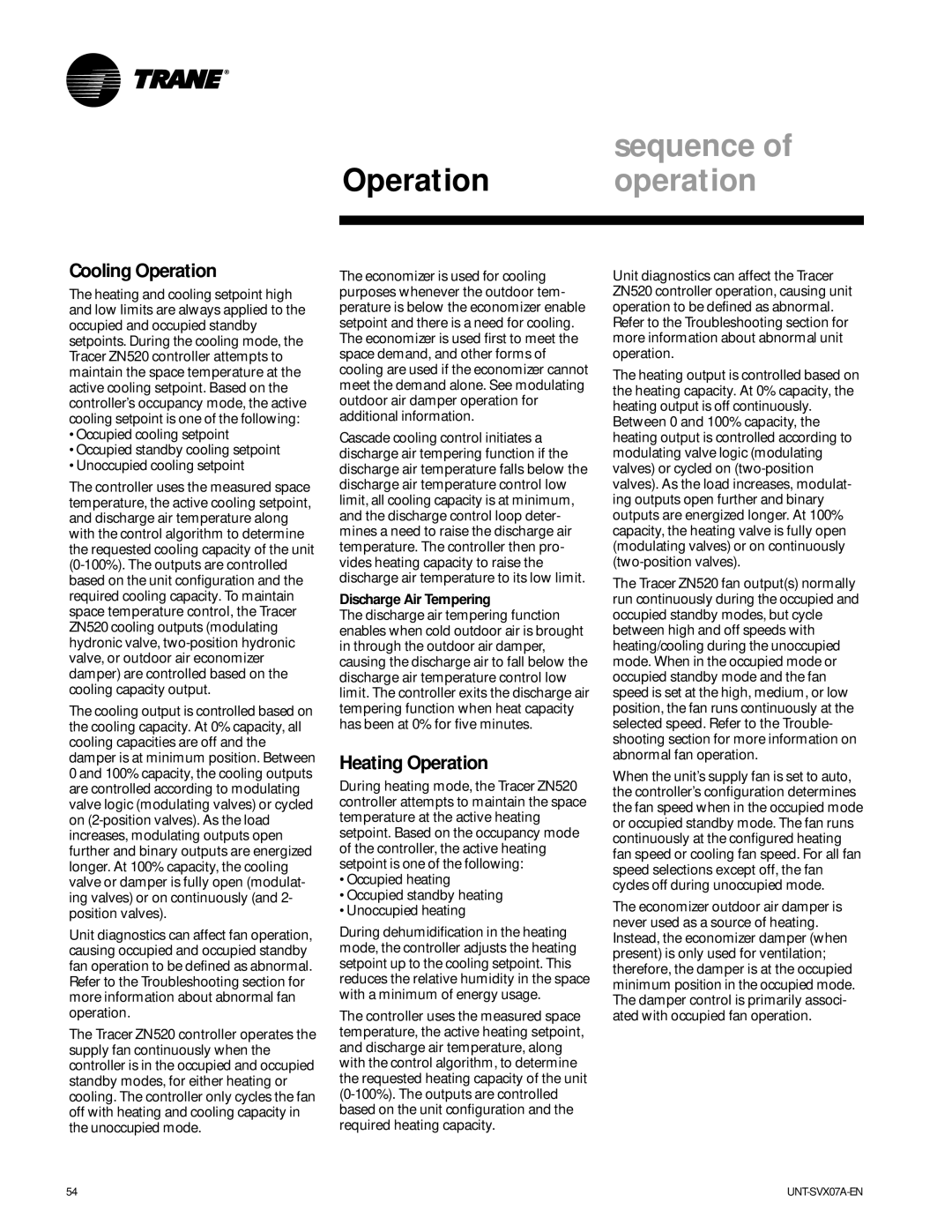
sequence of
Operation operation
Cooling Operation
The heating and cooling setpoint high and low limits are always applied to the occupied and occupied standby setpoints. During the cooling mode, the TracerZN520 controller attempts to maintain the space temperature at the active cooling setpoint. Based on the controller’s occupancy mode, the active cooling setpoint is one of the following:
•Occupied cooling setpoint
•Occupied standby cooling setpoint
•Unoccupied cooling setpoint
The controller uses the measured space temperature, the active cooling setpoint, and discharge air temperature along with the control algorithm to determine the requested cooling capacity of the unit
The cooling output is controlled based on the cooling capacity. At 0% capacity, all cooling capacities are off and the damper is at minimum position. Between 0 and 100% capacity, the cooling outputs are controlled according to modulating valve logic (modulating valves) or cycled on
Unit diagnostics can affect fan operation, causing occupied and occupied standby fan operation to be defined as abnormal. Refer to the Troubleshooting section for more information about abnormal fan operation.
The TracerZN520 controller operates the supply fan continuously when the controller is in the occupied and occupied standby modes, for either heating or cooling. The controller only cycles the fan off with heating and cooling capacity in the unoccupied mode.
The economizer is used for cooling purposes whenever the outdoor tem- perature is below the economizer enable setpoint and there is a need for cooling. The economizer is used first to meet the space demand, and other forms of cooling are used if the economizer cannot meet the demand alone. See modulating outdoor air damper operation for additional information.
Cascade cooling control initiates a discharge air tempering function if the discharge air temperature falls below the discharge air temperature control low limit, all cooling capacity is at minimum, and the discharge control loop deter- mines a need to raise the discharge air temperature. The controller then pro- vides heating capacity to raise the discharge air temperature to its low limit.
Discharge Air Tempering
The discharge air tempering function enables when cold outdoor air is brought in through the outdoor air damper, causing the discharge air to fall below the discharge air temperature control low limit. The controller exits the discharge air tempering function when heat capacity has been at 0% for five minutes.
Heating Operation
During heating mode, the TracerZN520 controller attempts to maintain the space temperature at the active heating setpoint. Based on the occupancy mode of the controller, the active heating setpoint is one of the following:
•Occupied heating
•Occupied standby heating
•Unoccupied heating
During dehumidification in the heating mode, the controller adjusts the heating setpoint up to the cooling setpoint. This reduces the relative humidity in the space with a minimum of energy usage.
The controller uses the measured space temperature, the active heating setpoint, and discharge air temperature, along with the control algorithm, to determine the requested heating capacity of the unit
Unit diagnostics can affect the Tracer ZN520 controller operation, causing unit operation to be defined as abnormal. Refer to the Troubleshooting section for more information about abnormal unit operation.
The heating output is controlled based on the heating capacity. At 0% capacity, the heating output is off continuously.
Between 0 and 100% capacity, the heating output is controlled according to modulating valve logic (modulating valves) or cycled on
The TracerZN520 fan output(s) normally run continuously during the occupied and occupied standby modes, but cycle between high and off speeds with heating/cooling during the unoccupied mode. When in the occupied mode or occupied standby mode and the fan speed is set at the high, medium, or low position, the fan runs continuously at the selected speed. Refer to the Trouble- shooting section for more information on abnormal fan operation.
When the unit’s supply fan is set to auto, the controller’s configuration determines the fan speed when in the occupied mode or occupied standby mode. The fan runs continuously at the configured heating fan speed or cooling fan speed. For all fan speed selections except off, the fan cycles off during unoccupied mode.
The economizer outdoor air damper is never used as a source of heating. Instead, the economizer damper (when present) is only used for ventilation; therefore, the damper is at the occupied minimum position in the occupied mode. The damper control is primarily associ- ated with occupied fan operation.
54 |
